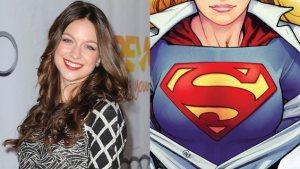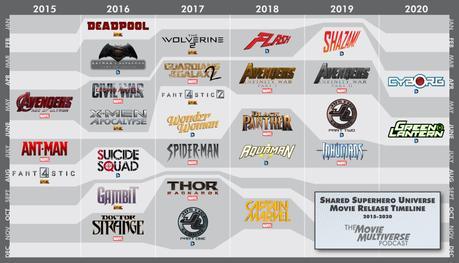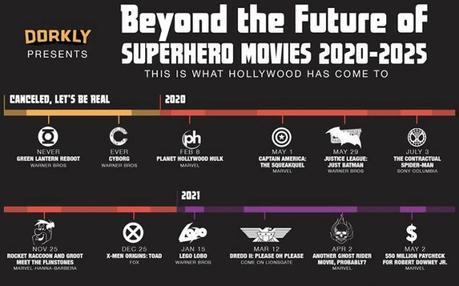Some people might have been feeling it beforehand, but pretty much ever since Warner Bros. pulled its “Surprise! Here are the crap-ton of DC movies we’re putting out through 2020!” and Marvel countered with its “Oh, screw you guys right in the ear! Here’s our list of movies due out by 2019!” superhero movie fatigue seems to have officially set in. It’s actually kind of hilarious on one level because everyone, including me, has stepped to the table to ask, “Are there too many superhero movies?” when, in fact, there were only five such movies released last year (Captain America, Spider-Man, X-Men, Guardians, Big Hero 6), and you can really quibble over whether Guardians of the Galaxy or Big Hero 6 truly deserve to be grouped with the others. That’s the same number of superhero movies we got in 2013 (Thor, Kick-Ass, Wolverine, Man of Steel, Iron Man 3). We’re actually taking a bit of a break this year, 2015 only serving up Avengers: Age of Ultron, Ant-Man, and Fantastic Four. It’s next year (when we get Deadpool, Batman v Superman, Captain America: Civil War, Suicide Squad, Gambit, Doctor Strange) and the years after that everyone is really worried about. And that’s before you start worrying about the assorted heroes and villains currently overtaking TV with Arrow, Flash, Gotham, Constantine, Agent Carter, Agents of SHIELD this season and Supergirl and an untitled Arrow/Flash spin-off next season.

Even with all the comic book TV shows currently in development, only one superhero show is at the pilot stage, the Melissa Benoist-starring Supergirl
As such, the people responsible for making all of these films and TV shows are going to be answering the “Are there too many superhero movies/shows?” question for the next couple of years. The latest example happened yesterday when Warner Bros. CEO Kevin Tsujihara made an appearance at the Morgan Stanley Technology, Media & Telecom Conference in San Francisco. He pretty much re-stated the company line (same for Warner Bros. and Marvel) on the topic which is that as long as there is variety in the worlds these films explore then superhero movie fatigue will continue to just be a thing a lot of journalists and cynics on the internet complain about. Well, he didn’t say that last part, but he definitely said the stuff about the need for variety.

The current 2015-2020 timeline for comic book movies, updated to reflect Marvel/Sony’s deal for a new Spider-Man. Found at ComicBookMovie.com
This is one of those things that can sometimes separate the comic book readers from the non-comic book readers when it comes to worrying over superhero movie fatigue: Just because these things share a common type of source material, comics and graphic novels, doesn’t mean they have to actually be that similar. Fox’s Deadpool is going to be a dark comedy with a fourth-wall breaking protagonist, Warner Bros.’ Suicide Squad is going to be a heist movie focusing on glorified villainous mercenaries, Marvel’s Doctor Strange is going to be something close to a fantasy story about dueling magicians. Those are three different genres that you wouldn’t otherwise group together, but we do because they’re all comic book movies just as we group Iron Man 3, Thor: The Dark World and Captain America: The Winter Soldier together even though those are very different kinds of movies albeit ones with eerily similar if not entirely identical plot structures.
So, yes, you should theoretically be able to stave off superhero movie fatigue by ensuring a consistent variety in the types of worlds you explore (frankly, rebooting Batman and Spider-Man again isn’t helping that cause), and you’d damn well better finally get around to adding in more diversity (please, no more white guys named Chris). Tsujihara agreed, arguing, “You have to take advantage of the diversity of these characters,” before pointing to CBS’ female-fronted Supergirl and the forthcoming Aquaman movie as ways to widen the demographics of super hero fans. He stopped short of pulling a Stephen Colbert-esque “Look, we have a black friend now!’ by touting the African-American-fronted Cyborg movie on the way, although we know Marvel has its own counterpoint on the way with Black Panther. The two companies also have competing female-fronted films, Wonder Woman for WB, Captain Marvel for Marvel.

Of course, there are those who just find this all funny. Found at io9.com
According to The Hollywood Reporter, Tsujihara also broadly characterized the tone of the DC shows/films as dark and edgy versus the lighter Marvel show/films. That does inspire thoughts like, “Hold on a second. Have you ever actually watched The Flash or Agents of SHIELD?” Dark and edgy describes SHIELD, at least the current version of it, far more than it does The Flash, and whatever edginess Gotham has is usually unintentionally funny. Plus, Netflix’s version of Marvel’s Daredevil is going to be a very grim show. But, really, “light” vs. “dark” or “edgy” seem like empty marketing terms, and the old “DC is serious, Marvel is fun” party line is broadly true and definitely seems to be the guiding force behind the films at this point. What exactly that might do to superhero fatigue – What if all DC movies are as self-serious as Man of Steel? – is anyone’s guess, although the obvious guess is that it won’t be good for business.

Ultimately, it all comes back to what Ted Hope told Flavorwire last year. He’s the author of Hope for Film, CEO of the VOD site Fandor, and producer of such films as The Ice Storm, Happiness, and American Splendor. Like so many others, he can’t imagine this bubble won’t burst eventually, especially now that Marvel’s shared universe approach is being emulated outside of comic book movies, “It feels incredibly vulnerable to me. Look, I’m surprised the superhero stuff has the legs that it does, but you look at what Warner Brothers and Marvel have mapped out, you add into it all of the Universal monster movies and all these others platform plays, and you better hope that nobody’s taste changes for the next five years, you know? That’s not a diverse portfolio!”
So true. But…can we just talk about how good Avengers: Age of Ultron looks? Maybe this will all have burnt to the ground before we ever get to 2020, but that seems so far down the road. Can’t we just enjoy how good some of these movies look right now?
Related Articles
- 7 Good Things You Can Say About Phase 3 of the Marvel Cinematic Universe | WeMinoredInFilm
- 7 Negative Takeaways from the Onslaught of Comic Book Movies Due Out Thru 2020 | WeMinoredInFilm
Source: Variety

